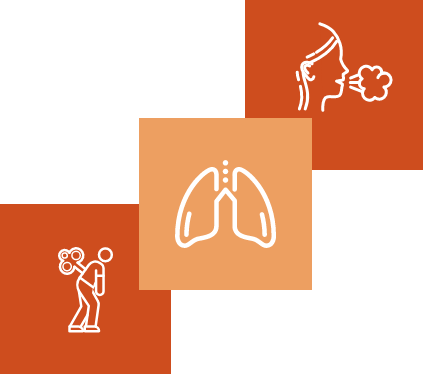
The IMPALA-2 autoimmune pulmonary alveolar proteinosis (aPAP) trial
Breathing new life into aPAP research
Why we’re doing this research
Autoimmune pulmonary alveolar proteinosis (aPAP) is a rare lung disease with no approved pharmacologic treatment options. The disease is characterized by the build-up of surfactant in the alveoli (air sacs) of the lungs leading to impaired oxygen transfer from the lungs to the blood.
People with aPAP may experience symptoms like shortness of breath and a decreased ability to exercise. Typically, shortness of breath is first observed upon exertion, but as the disease progresses, shortness of breath can be experienced even when a person is at rest. Cough, as well as episodes of fever, can also be experienced especially if secondary lung infection develops. In the long-term, the disease can lead to serious complications, including lung fibrosis and the need for lung transplant.

Details on the IMPALA-2 aPAP clinical trial
This clinical research trial is being carried out to discover whether molgramostim nebulizer solution:
- Is safe to take
- Can help to reduce the symptoms of aPAP
Clinical trial design
The IMPALA-2 trial is looking at whether the investigational drug, molgramostim nebulizer solution (molgramostim), is safe and effective for improving lung function in adults living with aPAP.
For the first 48 weeks of the trial (Period 1), molgramostim will be compared with placebo (which looks like molgramostim but does not contain the active ingredient). During the second 96 weeks of the trial (Period 2) all participants will receive molgramostim. Both molgramostim and placebo will be given on top of the current standard of care, which includes supplemental oxygen when required and rescue treatment with whole lung lavage, if needed.
During Period 1, trial participants will be randomly assigned by a computer to receive either molgramostim or placebo.
Approximately 160 people with aPAP are taking part in IMPALA-2 trial centers across the globe.
Still have questions? Read our FAQs.
IMPALA-2 aPAP Clinical Trial FAQs
Where is the trial being conducted?
The trial is being conducted within North America, Japan, Australia, South Korea and approximately 15 countries across Europe.
How is the investigational treatment taken during this clinical trial?
The investigational treatment is taken by inhalation once per day via a nebulizer.
Has the potential treatment that is being studied been studied in aPAP patients before?
Yes, two other previous clinical trials have been conducted. There has been a trial in healthy volunteers, as well as a trial in patients with aPAP (138 patients) which demonstrated improvement in clinical outcomes in patients with aPAP.
What is the goal of this trial?
The IMPALA-2 clinical trial is looking at whether the investigational drug, molgramostim nebulizer solution (molgramostim), is safe and effective in adults living with aPAP.
How long will the trial last?
The trial will last up to 144 weeks. For the first 48 weeks of the trial (Period 1), trial participants will be randomly assigned by a computer to receive either molgramostim or placebo. Pending applicable regulatory and ethics committee approvals, during the second 96 weeks of the trial (Period 2) all participants will receive molgramostim.
